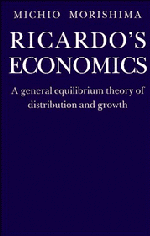1 - Prices and the Ricardian marginalism
Published online by Cambridge University Press: 01 June 2011
Summary
1 There are two kinds of commodities; one is scarce and the other can be increased in quantity by production. Concentrating on the latter, Ricardo considered that the ratio between supply and demand may, for a time, affect the market price of a commodity but this effect will be only of temporary duration, where production is made under competitive conditions. Abstracting from momentary or everyday fluctuations of price, its normal level (or what Ricardo called the natural price) is ultimately regulated by the cost of production. In a primitive society where goods are mainly produced by labour, without much use of machinery or tools, commodities are exchanged in inverse proportion to the quantities of labour necessary for producing them. As he quoted from Adam Smith, ‘If among a nation of hunters, for example, it usually cost twice the labour to kill a beaver which it does to kill a deer, one beaver should naturally exchange for, or be worth two deer’ (p. 13). This primitive labour theory of value, however, does not hold true in a more developed industrial society, where tools and machines are employed in producing various commodities. Ricardo clearly recognized this limit to the labour theory of value and, therefore, developed an extended theory of prices which has a dual structure, one section dealing with price determination and the other with the labour theory of value.
- Type
- Chapter
- Information
- Ricardo's EconomicsA General Equilibrium Theory of Distribution and Growth, pp. 17 - 35Publisher: Cambridge University PressPrint publication year: 1989



